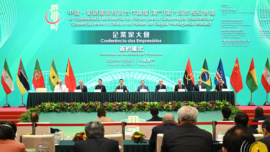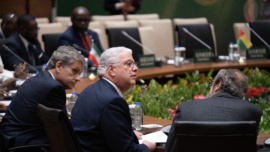The local economy will continue to contract, says credit rating agency Moody’s, predicting that the continual squeeze will ‘delay any recovery in growth to positive territory to beyond 2018,’ it announced in its recent annual credit analysis, which downgrades the government issuer rating to Aa3 from Aa2 and assigns a negative outlook to the rating.
The drivers behind the rating agency’s poor outlook for the local economy were stated as ‘a sharp weakening in the economy, with growth remaining highly volatile,’ and ‘the limited policy response to the fall in gaming revenues,’ the report states. A further prediction that the MSAR ‘will record a fall in gaming revenues for 2016 and 2017,’ leading to ‘overall sovereign credit risk’ – placing it within the Aa3 category – completes a picture that the local economy will contract by 6.0 per cent year-on-year in 2016, amid falling gaming revenues. The rate of decline will slow to 2.5 per cent in 2017.
Long-term
Part of the concern affecting Moody’s downgrade is a ‘lack of clarity on the government’s own fiscal goals,’ specifically: ‘no medium-term trajectory for revenues or expenditures,’ with the group predicting a fiscal surplus ‘falling to 0.5 per cent of GDP [gross domestic product] in 2017 from 1.0 per cent in 2016’.
Particular negative weight is placed on the government’s ‘popular cash handout scheme,’ and the group notes that ‘fiscal deficits beyond 2018 cannot be ruled out’ unless current transfers are reigned in or mass and non-gaming revenues increase.
Current reserves, however, are still noted as ‘an ample buffer’ for the falling revenues and evaluate the city’s event risk as ‘Low (+)’ given that it’s ‘driven by a banking system that is large and at risk of spillover effects from exposure to Hong Kong, China and Portugal,’ further noting that ‘the domestic and geopolitical environment is benign, and ample fiscal reserves provide the government with sufficient liquidity buffers’.
The city is also propped up by the pataca, which Moody’s predicts ‘will remain stronger than most other currencies – including the Chinese yuan – because it imports US monetary policy,’ the consequences of which will be increased pressure on the MSAR’s ‘export of goods and services’ and ‘policy trade offs against the backdrop of a sharp slowdown in growth.’ While the report notes that ‘inflation has moderated because of lower global oil prices,’ the city has still seen a ‘less dramatic’ fall in inflation compared to its neighboring regions ‘due to Macau’s tight labour market and low spare production capacity’. The current situation which ‘does not have an inflation target’ is seen as ‘viable so far’ while helping to ‘maintain financial stability’ yet still has shown to be ‘more volatile relative to Aa-A rated peers,’ Moody’s report states.
Risks
Potential threats to the current credit situation are both local and external, with local risk concentrated in the housing market and minimally so in the banking sector. The agency notes that while housing prices have ‘stabilised’ prices have ‘more than doubled over the past three years,’ attributable to ‘low interest rates, limited new supply and rising household income,’ spawning the threat of a ‘potential severe correction in the housing market’.
The direct effect could be ‘lower loan collateral value and lower consumer spending levels,’ notes the agency, as average transaction prices for residential building units have fallen ’13 per cent in 2015 and a further 18.5 per cent year-on-year in the first quarter of 2016.’ The result: ‘a continued slump will likely keep prices and transaction volumes on the downtrend.’
The second and less volatile threat lies in the banks, and although: ‘the size of the banking system is large, asset quality is high,’ with ‘the three largest banks […] likely to receive high support from their Chinese parents,’ leading to a viewpoint that ‘the probability of a withdrawal of support is low, even in the event of adverse developments in operating conditions, given the political implications.’
Outside risks mainly originate from Mainland China and although the prediction is for ‘foreign direct investments to remain healthy, although at lower levels than those recorded over the last five years,’ of note is that ‘external vulnerabilities arise primarily from Macau’s strong dependence upon China,’ state the analysts.























